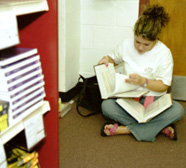The bookstore opened this fall under a new vendor with nearly $100,000 worth of renovations that included new carpet, tile, paint and shelving.
But with these changes, some students and faculty members say it’s just a new surface to a shabby operation.
The refurbishment came after the university decided last March to terminate its 12-year contract with Follett Higher Education Group. A committee, comprised of City College professor Dee Harper, associate professor Andrew MacDonald from the English department, financial affairs controller Mike Breath, vice president of business and finance Rhonda Cartwright, internal audit director Debbie Zimmerman, student activities director Chris Cameron, student affairs vice president Dr. James Eiseman and student government representative Martina Mills, investigated the university’s conflicts with Follett. The committee decided that Follett’s managerial policies weren’t in line with the school’s and community’s best interests.
“Given recent changes in Follett corporate leadership, unreasonable directives to store managers and the decline in financial returns to both parties a change in vendors was warranted,” Cameron wrote in a press release.
The committee unanimously voted in March to accept a contract with College Book Stores of America, an operating company that focuses on smaller campuses. In an electronic press release, Cameron cited the company’s ability to cater to small and mid-sized schools, rather than being a big-bulk carrier, as a reason for the choice.
Cameron said that “students may see a small percentage drop in textbook prices, as CBA [College Book Stores] does not pass on freight costs to its customers,” but that ultimately, “textbook pricing is still largely dependent on the publisher’s retail price.”
Students complained this fall that the stacks were disorganized and that many books had their prices blacked out – if not completely removed. Students didn’t find out how much they had spent until the final total was rung up at the register.
“I wish I would’ve known that I was going to spend $530 on books, but since they blacked out the prices, I had no idea,” said marketing junior Jeff Barker.
Long lines were another frequent complaint.
“With nine registers, I waited 30 minutes,” Barker said.
The students aren’t alone when it comes to finding problems with the new facility. Faculty members also have commented on a change in organization that has left some students thinking that their
books had not arrived on time.
“Not all the books for one class are in the same place,” the Rev. Peter Bernardi, S.J., an associate professor of religious studies, told his Theology and Culture class. “The books for our section are sort of on the same wall. They aren’t in the other room, though, at least you can give [the bookstore employees] credit for that.”
Cameron said that the university took bookstore employees into account when making the decision to terminate with Follett. Carol Knight and Dwan Haydel, both of whom had formerly worked for Follett, accepted positions with College Book Stores as manager and assistant manager, and said that they were excited to implement changes.
Other bookstore employees were offered their standard salary for
a six-month trial period, and Cameron said that Loyola required College Book Stores to pay its employees not less than the “social justice wage.”
Cameron also said that, as a term of College Book Stores’ five-year initial contract, the facility’s management would abide by the Worker’s Rights Consortium rules regarding sweatshop apparel.
The move to a new vendor comes as Loyola initiates a comprehensive campaign to establish a national reputation as a “social justice university.”
The plan not only includes the bookstore changeover, but Web site renovations that Cameron said will include an online Loyola-wear shop.

Chartenya Gray, a sophomore finance major, waits in line for nearly an hour to buy books for her fall classes. The bookstore reopened with nearly $100,00 worth of renovations and an online spirit wear catalog, but many students have expressed frustration with long waits and missing books.








